Stifyn Emrys's Blog, page 2
May 10, 2013
Public Figures and Social Media: Some Guidelines and a Little Advice
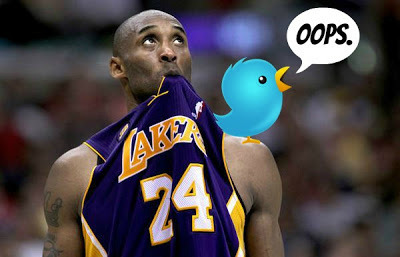
Who is a public figure?
When can you quote something a public figure posts online?
These are two legitimate questions, and I'd like to tackle the second question first, using a recent example. The San Antonio Spurs recently swept the Los Angeles Lakers in the first round of the NBA playoffs. But was this the big news? That's debatable. Many media outlets made a bigger deal out of injured Lakers star Kobe Bryant's tweets from the sidelines.
Most of Bryant's tweets involved analysis and tips for the team. Here's a sampling (misspelled words are sic):
"I love how Nash is moving so far. Both teams a lil out of rhythm to start.""@nabarocksstc I agree. Lethargic start for us. Gotta minimize little mistakes like giving the middle drive on close outs""Nothing worse then watching your bothers struggle and u can't do crap about it #realtalk"
Bryant was obviously frustrated that he couldn't be out on the court with his teammates (a torn Achilles' tendon saw to that), so he was trying to "play" vicariously through his Twitter account.
Bryant certainly knows he's a public figure, and he must have realized that the media were going to see his tweets. Still, he didn't seem to realize how heavily the media were going to emphasize his comments, and he eventually decided to stop tweeting: "I see my tweeting during the game is being talked about as much as the game itself," he wrote. "CHOOSE not [to]. Focus should be on the team not my insight."

Now to the second question: Who is a public figure?
There are two ways one can qualify for this label: First, you can become a public figure by becoming famous. But famous people aren't the only public figures. You can also become what's called a limited purpose public figure. According to the Reporters Committee for Freedom of the Press, this is "someone who is not so famous as to be a household name, but who has become well known with regard to a particular issue."
People who seek the limelight often fall into this category. Authors Tad Crawford and Kay Murray put it this way in The Writer's Legal Guide : "Private individuals can become 'limited purpose public figures,' when they actively, voluntarily or willfully seek the public eye."
This applies perhaps no more clearly than to people whose name is their franchise. Artists, authors, solo musicians and some athletes fall into this category. Names like Kobe, Tiger, Madonna, Stephen King and Taylor Swift come to mind. If you're marketing your name, you're a limited purpose public figure. If you're marketing your name and you're famous (such as the above folks), there's nothing limited about it. You're a public figure, period.
One must assume that a public figure speaking on a public forum such as Facebook or Twitter is making what amounts to a public statement. Is it OK to quote one? Sure, it is - unless the person being quoted can demonstrate the other person 1) is guilty of defamation and 2) has "actual malice" toward him or her.

Bursting the bubble
So, how should a public figure act on Twitter or Facebook? And how should other social media users behave when quoting public figures (beyond the obvious of avoiding defamatory and malicious statements)?
If you're a public figure posting on Facebook or Twitter, make sure your posts are something you'd be proud to have repeated. Too often, people on social media act like the driver who rocks out to his favorite tunes or flips off a police officer from behind the wheel, assuming no one else can see him. He's wrong. The privacy bubble he thinks exists within the confines of his Fiat or El Dorado is an illusion. The roadway is public, and so are the social media.
In fact, Facebook and Twitter are both actually designed to make quoting people as easy a single mouse click. Each has its own handy dandy tool: On Facebook, it's called the "Share" option; on Twitter, it's "Retweet." Don't want to be quoted? Simple. Keep it off your Facebook wall or Twitter feed. Both services offer private mail/messaging features that are easy to use, perfect for more confidential interactions (but be careful: nothing online is entirely confidential).
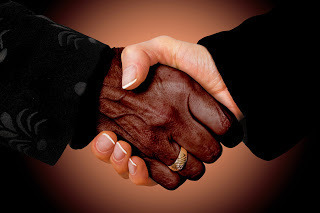
Show some respect
So, if you want to quote another person's post on Facebook or Twitter, you don't have to ask. But you shouldn't use their posts as an excuse to excoriate them in public. It's better to treat people with respect than think you can act with impunity. You're not in a bubble, either.
Never quote someone's Facebook or Twitter post out of context. Make sure you're fairly representing what the person said, not twisting it to fit your own agenda. Don't make someone appear to agree with you or support your position by manipulating their quotes. That's flat-out unethical.
It's also unethical to pass off someone else's words as your own. That's called plagiarism, and it's just as unacceptable online as it is on a college term paper. If you're quoting someone, include attribution.
One more tip: Be sure you're quoting the person you think you're quoting. There are any number of people out there who think it's fun to impersonate public figures - especially on Twitter. If you don't believe me, try doing a search for Rowan Atkinson on Twitter and see how many results pop up. Is any of them the real Rowan Atkinson? When in doubt as to someone's identity, don't quote the person. It's better to follow the account for a while, crosscheck it with other facts you find online and make sure the person is the genuine article.
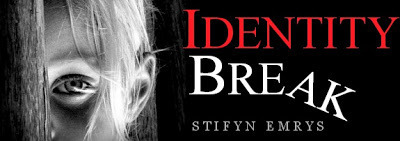
Exposure has its price
If you're a public figure posting something on Facebook or Twitter, every post you make is an official statement, as surely as if you'd sent out a news release. Are you a public figure who uses social media largely to promote yourself? Do you have a banner on your Facebook page that promotes your latest album? Does your Twitter account identify you as "the author of ..."? If so, you're using the social media as a marketing tool, and its contents must be viewed as representing the product: you. You have an obligation - not only to your potential customers, but to yourself - to represent yourself with dignity.
If you're debating something, whether on Facebook or blogging back and forth, don't get drawn into heated arguments, don't make it personal. Keep it about the issues.
That doesn't mean you should be afraid to be passionate. If you believe in something, say so. For instance, I believe strongly in equal rights, same-sex marriage, freedom of (and from) religion, and standing up to bullies. If I post something about my beliefs on one of my social media sites, I shouldn't have a problem being quoted. In fact, if I really do believe in it, I should be proud of the stance I've taken and should be glad when others share my words. That said, it's in my own interest not to come off as shrill or defensive. When that happens, the tone overpowers the message.
And finally, if you're a public figure and someone quotes you fairly and accurately from the social media, with attribution and respect, don't complain about it. Go with it. Even if the person disagrees with you, it's free publicity, and that never hurts. Besides, you might just learn something.

Published on May 10, 2013 10:55
May 8, 2013
Self-Published Authors: Liberators or Barbarians at the Literary Gate?

Is independent publishing a blessing or a curse? The answer to that question depends on whom you ask.
A few days ago, bestselling traditional author Michael Grant (the "Gone" series) typed up a post on his Facebook profile that started with the words, "I have never been a big Amazon hater. But that's starting to change." Interestingly, Grant's criticism didn't come from an author's standpoint, but rather from a reader's. His criticism dealt, specifically, with self-published works, and with the difficulty of wading through a lot of muck to get to the good stuff.
"I have absolutely nothing against self-publishing. In theory," Grant wrote. "But ... when I go to scan the bestseller lists at Amazon, looking for something to buy for my Kindle app, I can't get past the thickets of crap. Their lists are choked with junk product."
He decried what he called "absolute, unreadable shit."
Grant has a point. By opening the doors to every Tom, Dick and Harry-not-named-Turtledove who wants to publish a book, Amazon (and, to be fair, Barnes & Noble, Smashwords and a few others) has created a crowded playing field.
This isn't just a challenge to readers, though. It's also an irritant - or worse - to at least four other groups: 1) traditional publishers, 2) traditional authors, 3) literary agents and 4) independent authors who produce strong work but have a devil of a time differentiating it from what Grant refers to as "crappy" books. I like to think I fall into the fourth category.
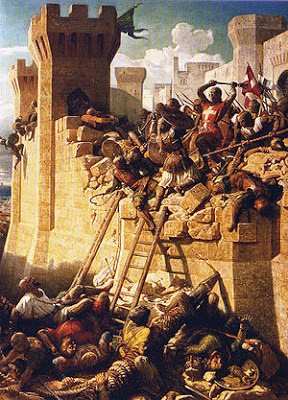
It would appear that Amazon has seen the barbarians at the gates and thrown them (the gates, that is) open - all to maximize profits, of course. But before you condemn self-published authors as a bunch of hacks who are poisoning the inkwell of publishing, consider the alternative: a system in which good authors with good ideas are often shut out of the process altogether. This is precisely what traditional publishing has offered. Many publishing houses don't accept unsolicited manuscripts from unknown or unagented authors. I call those the three "uns."
It's the old conundrum of "you have to have experience to get a job, but you have to have a job to get experience." If Amazon has thrown open the gates to a populist revolution, the old guard has long bolted them shut to any number of deserving writers.
Grant admits this system is far from perfect, stating that traditional publishing's "reliance on agents is obnoxious" and calling it tantamount to "publishers saving money by screwing writers." But, he says, "that's a separate issue from what Amazon is doing."
I beg to differ. Both issues are part and parcel of the same question: "Who will act as a gatekeeper between the author and the reader?" Agents are part of the traditional gantlet of gatekeepers, a system that includes such mainstays as acquisitions editors, query letters, proposals, outlines, slush piles and so forth. You may be a great author, but if you've got no agent or your query runs afoul of some acquisitions editor, your manuscript will wind up in the scrap heap.
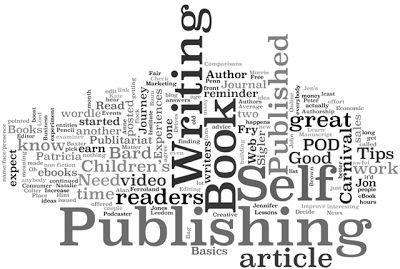
The new alternative is the self-publishing system, which, in contrast to traditional publishing offers nearly direct access to readers. It's the Protestant Reformation of publishing. Until recently, writers had few choices. They could submit their manuscript on the altar of one publishing house after another. Then, if they were fortunate enough to get a green light, they would wait a year or two more before seeing their books in print. Publishers and agents were the priests who held the keys to the kingdom of publishing heaven.
There was one other alternative: Authors could purchase the "indulgence" of a so-called vanity press.
Then, along comes Amazon and offers something analogous to what Luther called the priesthood of all believers - an authorhood of all readers.
But not quite all readers.
Before despairing that the barbarian hordes are about to inundate a bunch of defenseless readers with a profusion of bad writing, we should take our fingers off the panic button and step back for a moment. It takes a good deal of effort to write a book - even a bad one - and the vast majority of readers will never even attempt the task, so it's not as though everyone with a pen or a keyboard is going to be writing the next Greatly Flawed American Novel.
Grant asserts that "as a practical fact, 99% of what I've seen (from independent authors) is riddled with spelling errors, amateur-hour editing, formatting errors, and so on." I can't argue this, but only because I can't attest to what Grant personally has and hasn't seen. I suspect, however, that it's an exaggeration. Even if true, however, it doesn't present a true barrier to the consumer.

It's not as though most readers have to sift through every novel on Amazon to find something they like. They'll typically narrow it down by price, genre, cover art and a host of other factors before even considering a purchase. For those who do consider buying a book, Amazon provides a nice little feature called "Look Inside" that offers them an opportunity to sample many of the books on its site (it's on all of mine). It should be pretty clear within a page or two whether a book is poorly written. Heck, it's often apparent just from reading the description. Is that really too much effort?
I'm sure there are a few errors and typos in my books; then again, that's true of traditionally published books, as well. But I have no worries about inviting any prospective reader - including Michael Grant - to read my samples, and I'm confident such errors will be few and far between. (Incidentally, Grant is to be commended for offering access to fans via Facebook - that's something many traditional authors don't do.)
The self-publishing platform Amazon offers is far from perfect, and there are plenty of traditional publishers out there with a good eye for talent and worthy content. But the system they're using has been broken for a very long time. Here's hoping the self-publishing revolution will prompt the kind of changes that are needed to improve access and content for authors and readers alike, whether the future lies in traditional publishing, self-publishing, or some yet-to-be-explored middle ground.

Published on May 08, 2013 19:43
April 30, 2013
Don't Condemn Christians for Only Believing Some Portions of the Bible
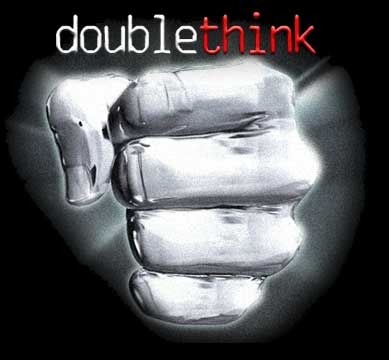
I have to laugh when I see non-Christians actually criticize Christians of picking and choosing which parts of the Bible to believe.
Isn't this precisely what they should be doing? It's called critical thinking. The Bible, unlike a Shakespearean play, Plato's Republic or the Harry Potter series, is an anthology. It was written by a diverse group of individuals from a variety of backgrounds with a host of competing - and sometimes conflicting - agendas over the course of several centuries. Its source material spans millennia.
So when Christians ignore an injunction in Leviticus and demand obedience to a command of Jesus (or vice versa), they're doing exactly what they're supposed to be doing. They're making value judgments as to which portions of this anthology apply to them and which don't; about which texts make sense and which defy logic. Sometimes, those judgments bolster their own prejudices, such as condemnations of same-sex relationships and beliefs in eternal torment. But the core problem isn't that they're making value judgments; the problem is that many of them won't admit it.
Christians who view the Bible as, literally, the word of their god, can't acknowledge this is what they're doing because it would upset their apple cart of supposed scriptural infallibility. The fact that they do so anyway isn't the problem. It means they're human. The problem isn't the critical smorgasbord approach to the scripture, it's the claim that it's somehow infallible.
Non-Christians and Christians who look at the Bible as a product of human history have no problem praising some portions of it and condemning others. The writers of Jeremiah and John wrote under completely different circumstances with entirely different aims. Or check out the writings of Paul and the Epistle of James. The two philosophies aren't just incompatible, they're diametrically opposed.
The critical mind recognizes this, and the honest mind doesn't try to reconcile it. The problem lies with the believer who tries to have it both ways. On the one hand, he admits that divine commands for wholesale genocide in the Old Testament aren't particularly moral and, but on the other, he insists that the biblical anthology is infallible.
Cognitive dissonance? You betcha. George Orwell called it doublethink: "the power of holding two contradictory beliefs in one's mind simultaneously, and accepting both of them."
The way to resolve this, however, isn't to stop viewing the Bible (or any other document) critically. It's to stop insisting on applying impossibly high standards such as infallibility to it. Such standards do provide a sense of false security, which is doubtless why they're imposed, but the resulting exercise in doublethink more than offsets it with a very real sense of insecurity that leads people to rationalize inherent contradictions - and lash out at those who expose the absurdity of those rationalizations.
Read more about these problems and others in my book Requiem for a Phantom God, available in paperback, as well as on Kindle (http://amzn.to/10nx028) and Nook (http://bit.ly/XjoCWd).
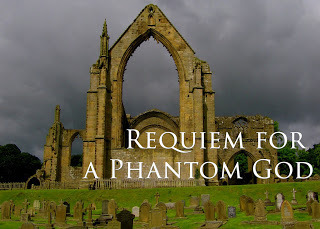
Published on April 30, 2013 11:56
April 24, 2013
A Question Regarding 'The Faith of the Seven' for George R.R. Martin
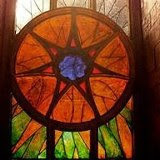
If I were to have a chance to ask George R.R. Martin a question, it would probably involve how he came up with his "Faith of the Seven," referring to the seven new gods of Westeros in "A Song of Ice and Fire/Game of Thrones."
When it comes to the three feminine gods, the author seems to have used Wicca as his template, presenting them as the Maiden, the Mother and the Crone. These feminine forms are represented as life stages, but the masculine forms are presented in a different context. While the Father corresponds clearly to the Mother, the other two masculine figures are defined not by a life stage but by a skill: the Warrior and the Smith. The seventh deity, which is asexual, is the Stranger.
What I'd ask Martin is this: Was it his intent to reflect a sexist attitude in the world he created by suggesting that two of the male deities were defined by their work or skill set, while the three female deities were defined by entrenched societal roles?
It's long been my contention that there is, in fact, an archetypal threefold "god" who is the rough counterpart to the triple goddess and who, like her, can be found in numerous traditions: the youth, the father and the elder. In the ruling classes, these correspond to roughly to the prince-princess, the queen-king and the witch/wise woman-wizard/sage.
This isn't meant as a criticism of Martin. He's the author, it's his world, and he can set it up however he chooses. It's just an observation from someone who finds mythical archetypes fascinating and sees fantasy novels as one means they're often preserved in modern society.
Certainly, sexism was rampant during the medieval period that serves as a model for many fantasy tales, even if they don't take place in our historical past, and Martin's depiction of figures such as Cersei Lannister and Sansa Stark shows that women were expected to mind their place in much the same way under the social norms of the world he created. Arya Stark's independence was the exception, not the rule.
I have to wonder whether Martin was sending a nuanced message by creating goddesses who are defined by who they are and gods who are identified by what they do. Is it a subtle dig at our own society's tendency to define men according to tasks and women according to roles?
Or is that reading too much into it? One of the most important rules of literature is that the various elements of any fictional world must be consistent with the society as a whole. The sexism that seems to me inherent in the Faith of the Seven accurately reflects that of the Westeros society at large. Certainly, it need not be taken as any more than that.
But I'd still like to ask Martin the question.

Published on April 24, 2013 15:37
April 5, 2013
"Artifice" FREE today only (April 5)
FREE today only on Kindle: My action-adventure "Artifice" in ebook form! Click here to download it: www.amazon.com/Artifice-Identity-Ques...
The year is 2058. Humanity is in a race against time to save itself from a climate crisis that has spun out of control, leaving millions dead from heat stroke and exposure. But Tim, a teenager growing up in Silicon Valley, has an advantage: his father heads the world’s largest corporation and has the power to keep him safe. Unfortunately, he’s not much of a father. In fact, he’s a self-absorbed workaholic who has no time - and no respect - for Tim.
At least Tim has his girlfriend, Annie, who grew up with him and helped him get through the worst that his father and the rest of the world threw at him. Now, however, they find their lives spiraling out of control in a whirlwind of corporate intrigue and cutthroat power plays that could cost both of them their lives and threaten humanity’s very existence.
What choice do you make when you run out of options? Whom do you trust in a game of deceit? Sometimes, it all comes down to a fight for survival. But the price for survival can be high. Would you trade your life for love? Your honor for hope?
The year is 2058. Humanity is in a race against time to save itself from a climate crisis that has spun out of control, leaving millions dead from heat stroke and exposure. But Tim, a teenager growing up in Silicon Valley, has an advantage: his father heads the world’s largest corporation and has the power to keep him safe. Unfortunately, he’s not much of a father. In fact, he’s a self-absorbed workaholic who has no time - and no respect - for Tim.
At least Tim has his girlfriend, Annie, who grew up with him and helped him get through the worst that his father and the rest of the world threw at him. Now, however, they find their lives spiraling out of control in a whirlwind of corporate intrigue and cutthroat power plays that could cost both of them their lives and threaten humanity’s very existence.
What choice do you make when you run out of options? Whom do you trust in a game of deceit? Sometimes, it all comes down to a fight for survival. But the price for survival can be high. Would you trade your life for love? Your honor for hope?
Published on April 05, 2013 01:35
•
Tags:
adventure, dystopian, e-book, free, science-fiction, ya, young-adult
April 1, 2013
IPCA issues 'anti-manifesto' on the current state of Pagan community
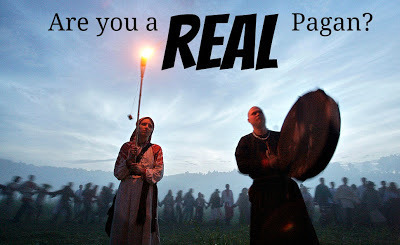
BREAKING NEWS
PALO VISTA, Calif. - The Inter-traditional Pagan Council of America (IPCA) issued a statement this morning condemning factional infighting within and among various Pagan traditions.
"The face of Paganism to non-Pagans is becoming increasingly one of discord and petty bickering over insubstantial matters," IPCA Vise President David Raith said in a statement. "We therefore thought it prudent to issue a statement on behalf of our organization, which represents thousands of Pagans practicing myriad traditions across this great country."
Raith described his group's statement as an "anti-manifesto." Instead of seeking to define Paganism, it invites individual Pagans to define their own paths according to three principles: free will, conscience and understanding. This, Raith declared, is the "three-fold law of liberty and respect" that "transcends any single path within Paganism and, indeed, is applicable beyond the Pagan milieu."
IPCA president Marta Villalobos, reached by telephone at her home in Ash Valley, Calif., confirmed the statement's authenticity and provided some background about why her group chose to issue the statement at this time.
"A number of people within the Pagan community have become so fiercely attached to labels that they have become proprietary about them," Villalobos said. "One group says, 'Only Wiccans can be Pagan.' Another says, 'Pagans must worship deities but cannot, under any circumstances, worship this or that deity.' Such trends are deeply troubling in light of well-known historical developments that proved, ultimately, very damaging to Pagan and Pagan-friendly individuals."
Villalobos pointed to the development of Christianity. As Christianity grew from a minority path to become the official religion of the Roman Empire and its political successors, she said, creeds were adopted and became increasingly complex. The more complex they became, the more they were used to isolate political enemies of the church hierarchy by labeling them as heretics and apostates. "These creeds," she said, "became an excuse to consolidate political power and marginalize anyone who did not agree with the 'established' and 'accepted' political position of the day."
IPCA officials say they are concerned modern Paganism may find itself in the early stages of this same destructive process, and seeks to educate the public about the damage it can cause.
The first principle, according to the IPCA statement, is the principle of self-identification.
"Imagine if we were to tell a gay man he couldn't call himself gay because he didn't fit into some pre-existing stereotype," Villalobos said. "Or what if we told a racially mixed individual she must identify with one race and not the other? Actually, we do this all the time. We presume to force people to fit our own stereotypes, whether or not they identify with the traditions we assign them. We are, in effect, saying, 'I know better who you are than you do.' " And that is simply wrong."
The IPCA statement came a day after the Pagan Force For Traditional Thought (PFFTT) issued put forth what it termed a "Pagan manifesto" that contained (among other things) the following creedal statements in the style of a medieval Papal bull.
"Any person who does not worship the gods yet calls himself 'Pagan,' let him be anathema.""Any person who acknowledges any teachings of Jesus of Nazareth, Mohammad or any other figure associated or affiliated with any monotheistic faith, let him be anathema.""Any person who shows reverence to deities from more than one pantheon, let him be anathema.""Any person who puts nature above the gods, let him be anathema.""Any person who knows not the difference between a pentacle and a pentagram, or between deosil and widdershins, let him be anathema.""Any person who mixes peanut butter and milk chocolate, let him be anathema."

PFFTT also touted the success of its online virtual cage match between the goddesses Ishtar and Oestre, which pitted the followers of two long-revered goddesses against one another in a no-holds-barred "battle royal for bragging rights to March 31." A hue-and-cry was raised when Ishtar was awarded the victory based upon PFFTT officials' lingering fondness for the 1980s box office bomb named for the goddess. (They were, admittedly, huge fans of Warren Beatty.)
Although IPCA did not respond specifically to PFFTT's "manifesto," it did declare the reverence for Ishtar and Oestre to be "infinitely more important" than some "contrived and provocative feud over proprietary rights to a holiday celebrated predominantly by Christians. And for those who don't worship either goddess, well, that's OK, too!" ..._________________
It should be clear by now that there is no IPCA (the initials were inspired by a series of books by novelist Kiersten White), and there certainly is no PFFTT (though some folks seem intent upon living up to that acronym when it comes to anything that doesn't conform with their particular philosophy or theology). David Raith and Marta Villalobos are, likewise, fictional characters.
This is, of course, April Fool's Day. But instead of simply posting some quick, funny comment, I decided to write about something a little more meaningful. IPCA may be a fictional organization, but if it existed, I'd certainly join it. The message of self-identification is important. Of course, it doesn't apply to people who falsely self-identify for personal gain, but when people genuinely self-identify as Pagan, Christo-Pagan, Secular Pagan, atheist, gay, lesbian or whatever, their right to do so should be respected. And that's no April Fool's joke.
Published on April 01, 2013 13:21
March 25, 2013
Announcing my street team!
I'm forming a street team called the Phoenix Vanguard to help promote my books. Are you interested in helping out and getting a LOT better chance of winning one of my books than you have on a Goodreads contest? Here's the lowdown:
As a member of my street team, you will:
Be eligible for exclusive book giveaway contests not available through Goodreads, KDP or elsewhere.
Receive tips from an editor with 30 years of experience (that's me).
Get an inside peek at my work, with updates.
Have opportunities for cross-promotion. I'll spread the word about your books, projects and pages through mine.
Be able to pick my brain, either one-on-one or via the group boards.
Be eligible for FREE minor editing and feedback on projects such as on an Amazon synopsis, a blurb or something a couple of paragraphs long.
Members of Phoenix Vanguard should:
Be fans on my books and be able to speak knowledgeably about one or more of them.
Be willing to promote my books, blog and updates about my work periodically throughout a given week.
Members will be given certain tasks, none of which will be too time-consuming or difficult. Most will involve spreading the word about my books, blog, contests and other projects on Facebook, Twitter and other social network platforms.
Be on the lookout for new fans interested in being on my mailing list, Facebook page or Twitter feed.
Stifyn Emrys
As a member of my street team, you will:
Be eligible for exclusive book giveaway contests not available through Goodreads, KDP or elsewhere.
Receive tips from an editor with 30 years of experience (that's me).
Get an inside peek at my work, with updates.
Have opportunities for cross-promotion. I'll spread the word about your books, projects and pages through mine.
Be able to pick my brain, either one-on-one or via the group boards.
Be eligible for FREE minor editing and feedback on projects such as on an Amazon synopsis, a blurb or something a couple of paragraphs long.
Members of Phoenix Vanguard should:
Be fans on my books and be able to speak knowledgeably about one or more of them.
Be willing to promote my books, blog and updates about my work periodically throughout a given week.
Members will be given certain tasks, none of which will be too time-consuming or difficult. Most will involve spreading the word about my books, blog, contests and other projects on Facebook, Twitter and other social network platforms.
Be on the lookout for new fans interested in being on my mailing list, Facebook page or Twitter feed.
Stifyn Emrys
Published on March 25, 2013 20:14
•
Tags:
contests, street-team
March 18, 2013
The Best Leaders Take a Stand Before Bigotry Affects Them
 Sen. Rob Portman of Ohio, center, with his family.
Sen. Rob Portman of Ohio, center, with his family."Once they realize that we are indeed their children, that we are indeed everywhere, every myth, every lie, every innuendo will be destroyed once and all." - Harvey Milk
Last week, Sen. Rob Portman of Ohio changed his views on same-sex marriage. He did so because his son is gay. Not only is Portman a prominent senator, he was also among the reported finalists for a spot on the Republican party's ticket this past year.
But this isn't an article about parties. It's an article about people. And Portman's decision to change his stance on same-sex marriage says a lot about how people make their decisions. When it comes right down to it, honorable people back those they love. They may or may not agree with their loved ones' decisions, but they don't stop loving them and they do support them in the face of criticism.
On the flipside, it also demonstrates how easy it is to make judgments in the abstract. If something doesn't affect you or those you love, it's easy to be harsh, dismissive and even bigoted. It's noble to stick up for family members, but does your family really deserve any better treatment than another's? Is my family any more worthy of our attention, compassion and respect than people I've never met?
 Harvey Milk
Harvey MilkYet Harvey Milk was right. This is exactly what happens, time after time. It happened to Dick Cheney, an opponent of same-sex marriage until his daughter came out as a lesbian. And it happened to Jerry Sanders, the mayor of San Diego, who did a 180-degree turnabout on the issue because he could not bring himself to tell his daughter, a lesbian, that her relationship wasn't as important as an opposite-sex couple's.
Even President Barack Obama chalked up his "evolved" position on the issue based on his own daughters' views: "It doesn't make sense to them and frankly, that's the kind of thing that prompts a change in perspective."
But here's the thing: It shouldn't have to come to that. We should be understanding enough to do the right thing before someone we love is directly affected - and even if no one we love ever is. We should be able to put ourselves in another's shoes, and we should already be "evolved" enough to understand abstract ideas such as human rights before we're hit over the head with a pretty big piece of concrete personal reality.
This is not to diminish the stands that Portman, Cheney, Sanders, Obama and others have taken. Each should be applauded for doing the right thing. For a contrast, see the statement made by House Speaker John Boehner on the subject in response to Portman's shift: "Listen, I believe that marriage is the union of one man and one woman. All right. It's what I grew up with. It's what I believe. It's what my church teaches me. And I can't imagine that position would ever change." Of course, for Boehner, it's all still very much abstract. But closing one's self off to the possibility of change is to become irrelevant - because change is going to happen, without you or not. The question is whether you'll be an instrument of change, someone who passively accepts it or someone who opposes it at every turn.
The Boehners of the world aside, more and more people are accepting same-sex marriage. They're doing the right thing. But in the best of worlds, we do the right thing for the right reasons. Heroes aren't people who act because their personal world has changed, they're those who act because they want to change things for everyone - for the better. It's only when we take the lead that we can truly claim to have evolved.

Published on March 18, 2013 13:50
March 17, 2013
A (Celtic) Knotty Question: Can Pagans Celebrate St. Patrick's Day?
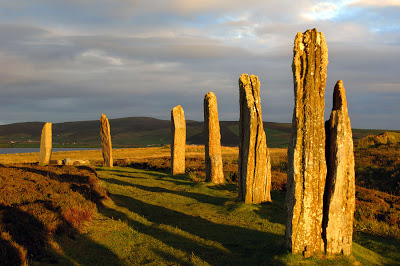
I recently started looking into my genealogy and watering the ol' family tree a little. I'm not sure, but maybe this is something you just do when you hit middle age and realizing there's no turning back: You try to turn back in a historical sense.
I had long known that my grandfathers came from France and Denmark, but what I hadn't known is that my maternal grandmother's family was nearly full-blooded Irish. So I got pretty excited when I found out I actually had a reason to celebrate a holiday of my own: St. Patrick's Day.
That's where things got complicated. When I pointed out my heritage on my Facebook page, some were indignant or confused: "Why do you celebrate that day?" I was asked. Didn't I realize that St. Patrick had driven the Druids (i.e., snakes) out of Ireland and, in doing so, had waged a religious war against them?
Hmmm. I hadn't thought of that. My first reaction, honestly, was a bit defensive. There are times when it seems that whatever one posts on Facebook, it brings critics out of the woodwork eager to squelch a person's enthusiasm. And, dammit all, I was excited about my Irish heritage. I wanted to celebrate it. Certainly anyone who knows me realizes that I'm 1) not Catholic and, 2) vehemently opposed to religious warfare and oppression. To quote the title of an album by Gaelic Storm, "What's the rumpus?"
Well, when I started to look at it from the critics' perspective, I realized they had a point. Hadn't I railed against celebrating Columbus Day because Columbus had been responsible for killing and oppressing Native Americans in the Caribbean? How was this any different?
Then I got to thinking again: Why should I tell Italians they don't have a right to celebrate their heritage, if I want to celebrate my Irish heritage? St. Patrick probably never drank green beer or consorted with leprechauns. So how did March 17 really celebrate the repression of the Druid way in Ireland, or was it more simply a celebration of Irish heritage?
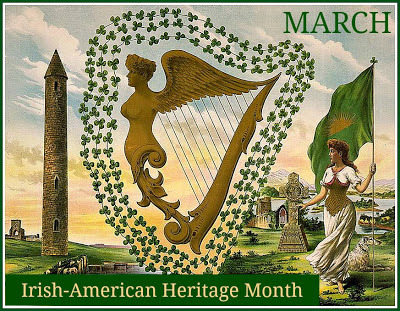
(As an aside, Patrick wasn't even the first Christian bishop of Ireland - that honor fell to a certain Palladius - and Patrick didn't succeed in expelling all the Druids from Ireland. Not by a long shot. Pagan rites continued to be practiced on the Island for nearly a millennium after his death. And they're being practiced again today.)
Both the Irish and the Italians came in large numbers to American shores in the late 19th and early 20th centuries, and both were just as much victims of bigotry and slander as the Druids had been. Can anyone really blame them for latching on to holidays to celebrate their heritage - one day out of the year away from the factories and sweatshops where they toiled to have a little fun? I certainly can't.
One certainly doesn't have to view the clover as a symbol of the Christian trinity, as Patrick himself is said to have done. One can see it as a symbol of the triple goddess or, heck, just as what it is: a clover!
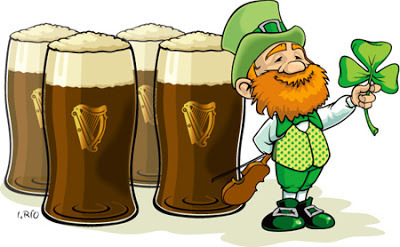
Does St. Patrick's Day glorify a man who supported and spearheaded religious oppression of the Druids? Or is it a day to celebrate Irish heritage, have a few drinks and take a twirl across the dance floor with a bonnie lass?
The answer is yes.
But it can be something more, too. Each year, Jews around the world remember November 9-10 as Kristallnacht, the "Night of Broken Glass." This was the time, in 1938, that the Nazi regime implemented a pogrom against Jews in Germany and Austria, smashing out the windows on the storefronts they owned and leaving glass strewn across the streets. By marking this day, they are vowing to never forget the atrocities committed against them.
So maybe, just maybe, days like Columbus Day and St. Patrick's Day can serve as this sort of reminder, too. The indomitable spirit of the Irish shines through on St. Patrick's Day, and that's something to celebrate. The spirit of the Native Americans has not been crushed, despite the deeds of Columbus, and endures proud to this day. That's something to celebrate, too.
This St. Patrick's Day, I'll drink beer from a green can, listen to some traditional Irish music and remember my ancestors who had a rough go of it - both when Patrick and his like invaded their shores centuries ago and when they came to America looking for a better life just a few generations before me. I won't be celebrating Patrick any more than German Jews celebrate the broken glass on the streets of Berlin. But I'll be remembering. And I'll be celebrating the fact that, while the bigots lie moldering in their graves, the spirit of freedom lives on.

Published on March 17, 2013 12:36
March 12, 2013
Pagans and Atheists: Plenty of Room for Constructive Dialogue
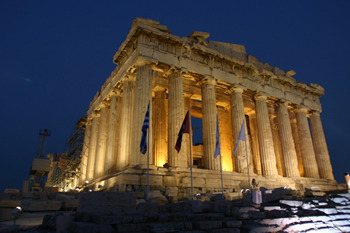
The following is a response to Ian Corrigan, author of the article titled “Into the Mound,” who posted his own response to my article “Pagan Atheists: Yes, We Exist.”
First, I’d like to thank the author for his thoughtful tone and encourage readers of this article who are interested to read it. For the purposes of brevity, I'm only quoting excerpts here and don't wish it to seem as though I'm taking anything out of context. This is the kind of intelligent give-and-take that I appreciate; disagreements can be stated without bashing or belittling, and everyone can walk away enriched by the experienced.
I’d like to begin by reiterating my position that the original piece was not meant as a condemnation of polytheism. There are quite a few rather bitter atheists who seem as intent upon proselytizing as fundamentalist Christians , and I think that’s too bad because their sour attitude obscures the message they’re trying to get across. I’m not suggesting that everyone “convert” to atheism, merely making a case for the acceptance of atheism within a Pagan context. There are Pagans who are dismissive of the idea that one canbe both a Pagan and an atheist; I take issue with this. I simply believe the Pagan umbrella is big enough to offer acceptance to both views (along with others and many variants).
There are a few things Mr. Corrigan and I seem to agree on. When it comes to the nature of the universe, I am very much of a mind that the entire thing is a unified whole. Mr. Corrigan’s statement that the gods are “part and parcel of nature” seems to be in agreement with this principle. On the other hand, I believe that living beings are also unified wholes, in agreement with the pattern of the universe as a whole. This isn't materialism (a term Mr. Corrigan uses that doesn't represent my personal view). I view it, rather, as integration.
I’m not “discarding half the business,” to use Mr. Corrigan’s phrase, I’m arguing for a unified view.
The idea that the spiritual and physical are somehow separate hearkens back to dualistic ideas found in the teachings of Zoroaster, the Gnostics and others. Adherents of such ideas soon began to argue that one facet of nature was one how superior to the other, and people wound up condemning the material and exalting the spiritual.
I personally think this was a big mistake.
On the other hand, I'm not advocating the opposite approach (condemning the spiritual and exalting the material). Far from it. What I’m proposing is an integrated approach that breaks down such distinctions because all are equally a part of nature.
In suggesting that the spiritual is dependent upon the material, I'm not at all suggesting that the material is somehow superior. The fact is that, when it comes to that quality we call “life,” the material is equally dependent upon the material. Focusing on one to the exclusion of the other is precisely the process that leads us to ignoring one or the other and missing out on the wonders of the whole.
An exception to the rule: There are times when one must, of necessity, focus on some specific component of a system. For instance, if a certain part of the body is ailing, we focus on restoring that part to health; it doesn't do us much good to take an aspirin when a bone needs to be set or pop a few Vitamin C's for a case of bronchitis. But in general, it’s most respectful to refer to a person rather than his component parts.
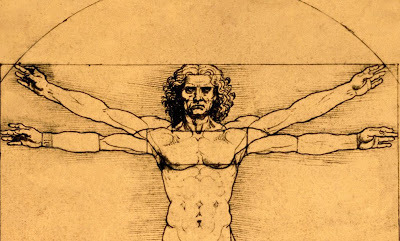
To say that I am both spiritual and physical misses the point. I am also a nose, a psyche, lungs, emotions and a whole assortment of other things. But I’m not any one of them to the exclusion of the others. I’m the whole. I’m me. Period. Just as the universe is the universe. The more we divide and subdivide our realities into various categories with convenient labels, the more, I think, we miss the grandeur of the unified whole and how it all works together. The parts are interrelated and interdependent, as in an ecosystem. When you focus on one to the exclusion of others, you run the risk of throwing everything out of whack.
Do spirits exist apart from the material? I have no experience of such, but neither am I arrogant enough to say that this isn’t possible. To be an atheist, as I use the term, is to be “without gods” - not to deny their existence, but to deny any experienceof such existence. Any attempt to prove a negative is an exercise in futility. But I can say I have no personal knowledge of gods, and that all my experience points to the idea that systems - whether they be human communities, ecosystems or individual organisms - function as integrated wholes rather than in isolation from one another.
I am not, myself, aware of spirits functioning in isolation from bodies, but consider this: bodies do not long function in isolation from what people refer to as spirits, either. They decay and become something else entirely. Recognition of this process is part and parcel of many Pagans’ beliefs. Again, this does not mean that spirits can't function without bodies; it merely means that, in my experience, they don't.
Another point on which I differ with Mr. Corrigan - and an important reason I cannot, personally, adopt his approach - is the primacy he appears to place on worship. In his article, he defines a god as “a mighty spirit who answers worship with blessing.” I have a hard time with this. The gods, in this conception, strike me as either 1) self-indulgent types who thrive on flattery or 2) supernatural on-off switches: you worship, they bless. I don’t generally trust individuals who need their egos stroked, and attributing this sort of behavior to a god does not, to me, make it any more acceptable. On the other hand, if they merely respond to human actions - you scratch my back, I'll scratch yours - that seems to demean the whole idea of godhood.
If beings called gods and goddesses exist as a part of nature, beyond the world of archetype and symbol, does that make them in any sense superior to other elements of nature? I would argue that the answer is no. Part of humanity’s problem, in my view, is the arrogance that places man/woman above the rest of nature, demanding obeisance and arrogantly proclaiming that the rest of the universe exists to serve us. In essence, it’s an attitude that insists on the sort of dynamic Mr. Corrigan appears to invoke: nature must serve us, or or we’ll withhold our blessing.
We cut down forests and drill oil, in essence demanding that nature to our will. This has nothing to do with nature. Earth will compensate, and the universe will continue. To nature, a human's well being has no greater value than an ant's or a redwood's - all are a part of the whole. And if gods exist and are a part of nature, as Mr. Corrigan believes (and as I would believe, if I were to believe in gods), I doubt they're any more important to nature than an ant ... or a human.

I don’t think the earth, the animals, the plants, etc. exist for our convenience any more than we exist for the convenience of some other element in nature (gods or goddesses). The very essence of our egotism is that we demand things be done our way rather than nature’s way. If gods do the same thing, what makes them better than humans? Mere power? And if that's all it is, does might make right?
I find Mr. Corrigan’s description of European sacrificial rites a positive contribution to the dialogue: “The tradition of animal sacrifice, at least in Europe, was a community barbecue in which a food animal was killed, butchered and cooked, with the gods getting the bones and fat and the humans getting the parts we could use.”
Thid practice. as presented. does, in fact, seem to be a noble tradition: Do not waste what you can use, and leave what you can’t use for a different purpose. I can't argue with this reasoning. I would, however, ask why entirely spiritual beings - if they exist - would have need of any physical elements. If they were, in fact, integrated beings as we are, the question would be moot. But if, as the author states, a god is a “mighty spirit” and the spiritual is “distinct from the material,” what need does the god have of anything physical?
Mr. Corrigan expresses a belief that some spirits “enjoy putting on our likeness” - becoming corporeal. The belief that gods could take human form was, indeed, widespread among the ancients. Let’s assume, for the sake of argument, this can occur. It is still insufficient to answer the question of why one should sacrifice a physical substance to a deity while that deity was in incorporeal form. One could be expected to offer a deity an invitation to dinner when he/she had taken on human form, because then (presumably), he/she would be able to enjoy it. But this is no less than the spirit of hospitality encourages us all to do for corporeal individuals who are “merely” human.
Then again, if deities can take human form, isn't that an argument - in itself - for integration rather than division? I think that's a question worth asking.
I’ll boil this all down to four points as follows:I disagree with Mr. Corrigan’s emphasis on a dichotomy of nature that consists of natural/supernatural or spiritual/physical. I prefer to view the universe and the individuals within it as integrated wholes (which I think fits nicely into the “as above, so below” pattern Mr. Corrigan quotes in his article).I disagree with the conception of gods as those who exchange blessings for worship. If such beings exist, I expect they’re infinitely more complex than this. (I honestly suspect Mr. Corrigan does, too, and I don't mean to represent this as his entire opinion on the matter.) And if they aren’t, I don’t have much respect for them.I don’t personally find any evidence of deities in my own experience; others testify to such experience. That doesn’t make either of us any less worthy of respect or any less Pagan. It just makes us different, and we’re both equally entitled to express our thoughts on the matter.I’m not seeking to denigrate polytheism or any other form of theism. In fact, I believe there is much commonality Pagans of all stripes can enjoy, whether they’re polytheists, pantheists, humanists, atheists or what have you. Rather than seeking to exclude any of these folks from the table, I think we should be welcoming one another as those who can contribute to a constructive dialogue for our mutual edification.

Published on March 12, 2013 23:50



